HI6027 Business and Corporate Law: Group Case Study Solutions
VerifiedAdded on 2022/11/12
|9
|2128
|133
Case Study
AI Summary
This document presents a comprehensive case study analysis of Business and Corporate Law, addressing two distinct issues. The first issue examines the liability of SOO Burgers concerning an advertisement offering Mazda CX-9s, evaluating the principles of 'invitation to offer' versus 'offer' as established in cases like Partridge v Crittenden and Carlill v Carbolic Smoke Ball Company. It also considers the revocation of the offer in relation to Mickey and Brett, referencing cases such as Byrne v Van Tienhoven & Co. and Dickinson v Dodds. The second issue focuses on whether a bank can recover a loan amount from Sparkling Pty Ltd, considering the application of the Corporations Act 2001, particularly sections 125 and 126, and the doctrine of indoor management, referencing the Royal British Bank v Turguand case. The analysis considers the powers of the managing director, the implications of the contract, and whether the bank, as an outsider, could assume compliance with internal company rules. The document provides detailed legal reasoning, applying relevant case law to the facts to reach conclusions on the liabilities of the parties involved and the potential outcomes of the cases.
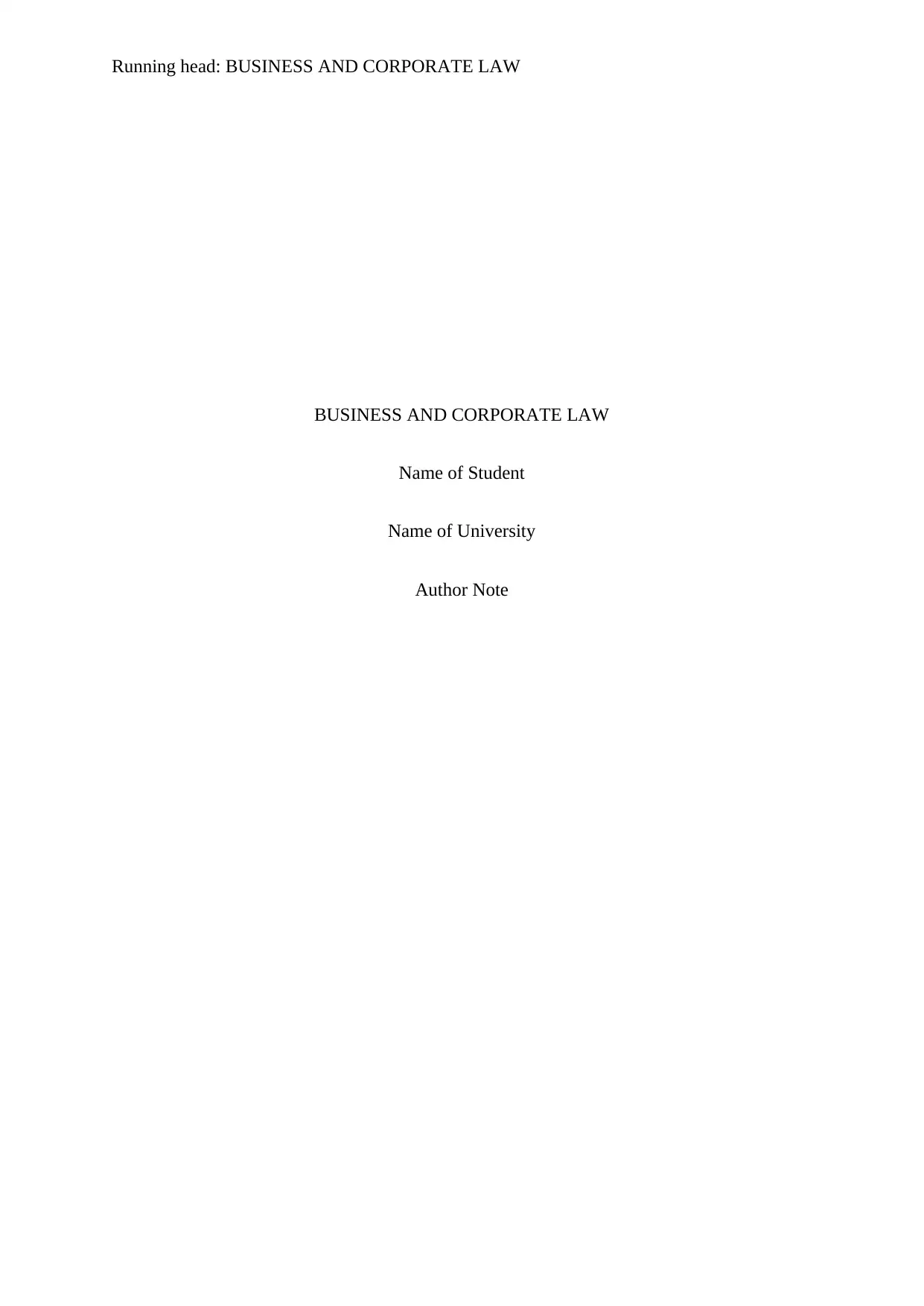
Running head: BUSINESS AND CORPORATE LAW
BUSINESS AND CORPORATE LAW
Name of Student
Name of University
Author Note
BUSINESS AND CORPORATE LAW
Name of Student
Name of University
Author Note
Paraphrase This Document
Need a fresh take? Get an instant paraphrase of this document with our AI Paraphraser
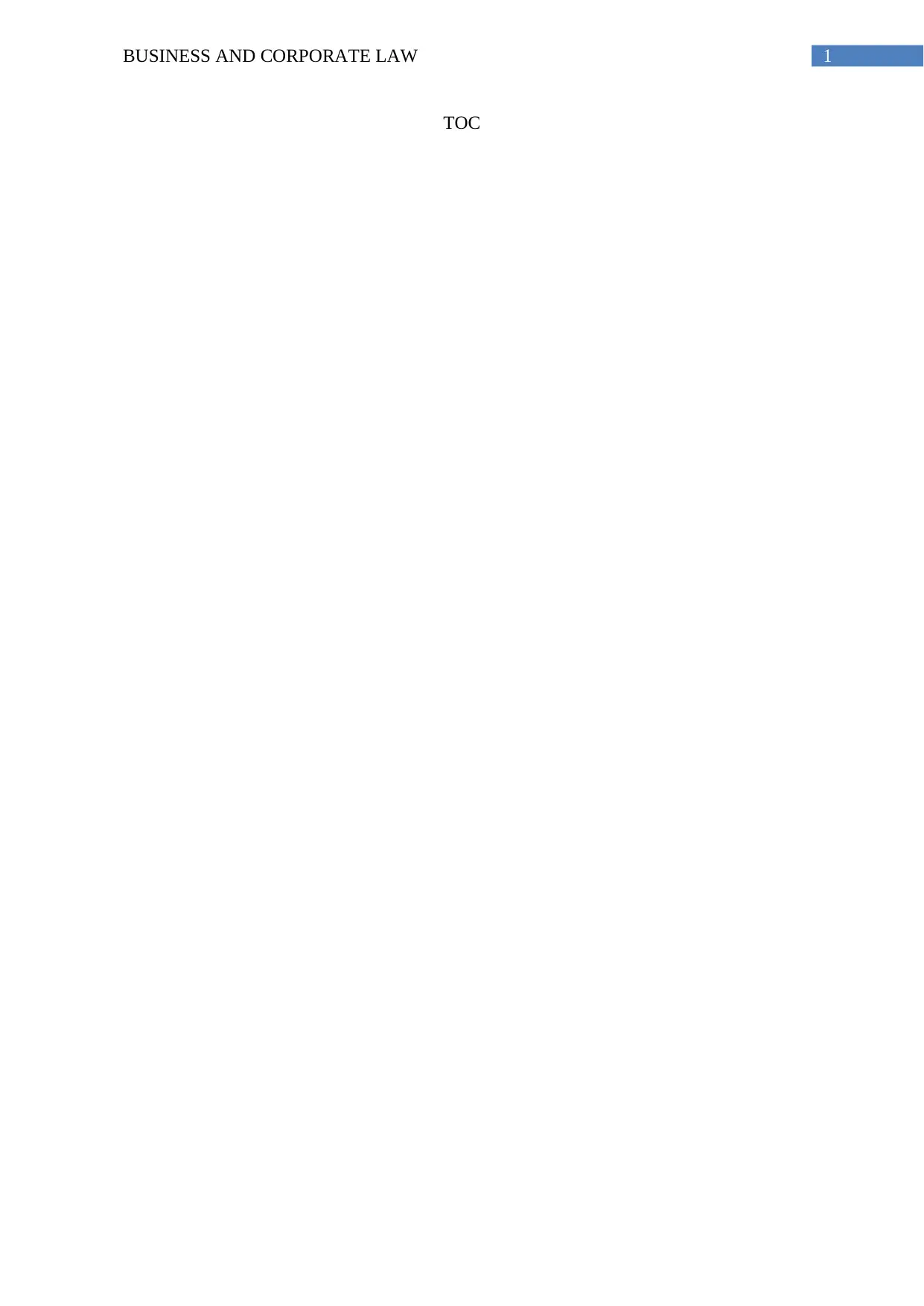
1BUSINESS AND CORPORATE LAW
TOC
TOC
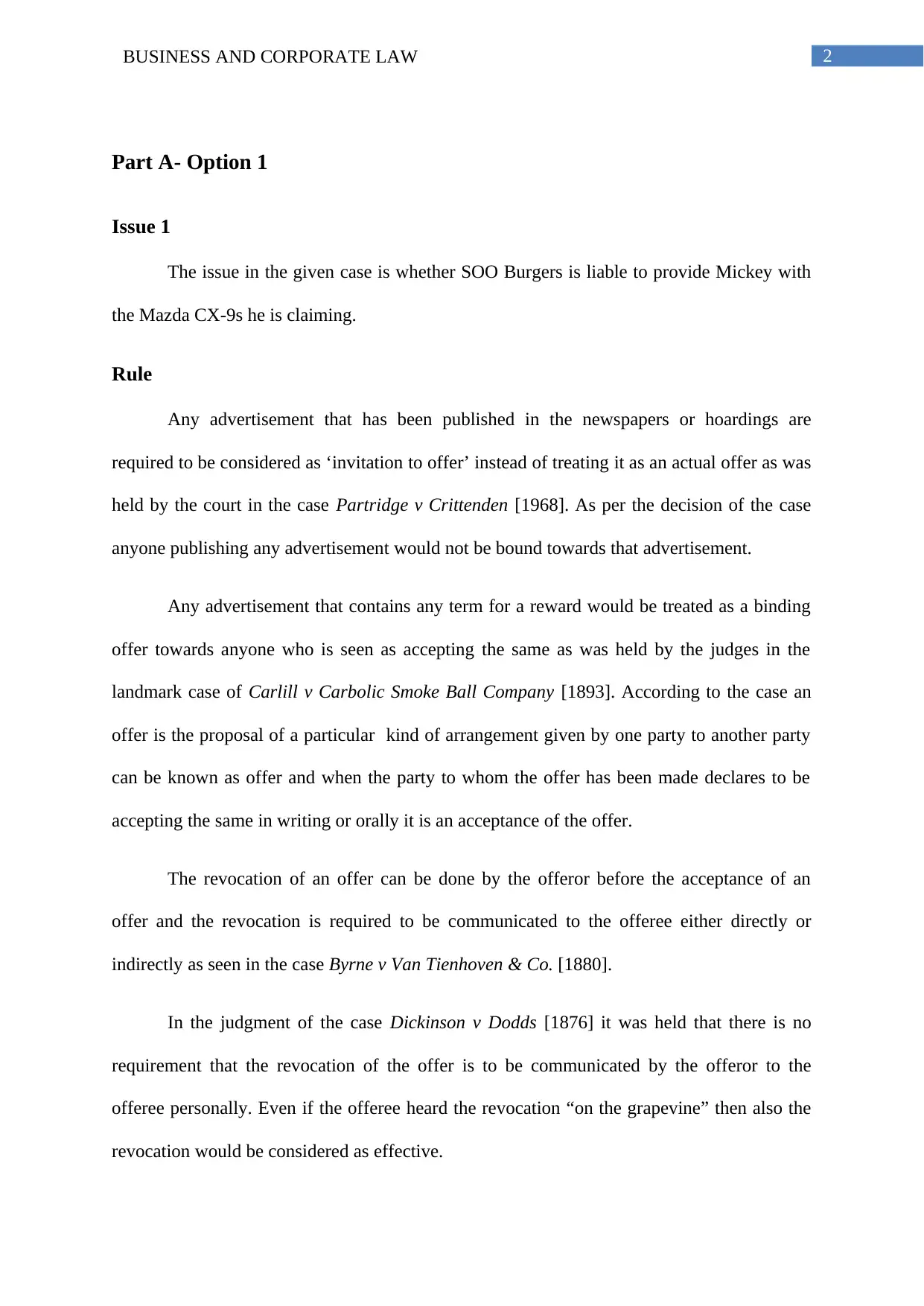
2BUSINESS AND CORPORATE LAW
Part A- Option 1
Issue 1
The issue in the given case is whether SOO Burgers is liable to provide Mickey with
the Mazda CX-9s he is claiming.
Rule
Any advertisement that has been published in the newspapers or hoardings are
required to be considered as ‘invitation to offer’ instead of treating it as an actual offer as was
held by the court in the case Partridge v Crittenden [1968]. As per the decision of the case
anyone publishing any advertisement would not be bound towards that advertisement.
Any advertisement that contains any term for a reward would be treated as a binding
offer towards anyone who is seen as accepting the same as was held by the judges in the
landmark case of Carlill v Carbolic Smoke Ball Company [1893]. According to the case an
offer is the proposal of a particular kind of arrangement given by one party to another party
can be known as offer and when the party to whom the offer has been made declares to be
accepting the same in writing or orally it is an acceptance of the offer.
The revocation of an offer can be done by the offeror before the acceptance of an
offer and the revocation is required to be communicated to the offeree either directly or
indirectly as seen in the case Byrne v Van Tienhoven & Co. [1880].
In the judgment of the case Dickinson v Dodds [1876] it was held that there is no
requirement that the revocation of the offer is to be communicated by the offeror to the
offeree personally. Even if the offeree heard the revocation “on the grapevine” then also the
revocation would be considered as effective.
Part A- Option 1
Issue 1
The issue in the given case is whether SOO Burgers is liable to provide Mickey with
the Mazda CX-9s he is claiming.
Rule
Any advertisement that has been published in the newspapers or hoardings are
required to be considered as ‘invitation to offer’ instead of treating it as an actual offer as was
held by the court in the case Partridge v Crittenden [1968]. As per the decision of the case
anyone publishing any advertisement would not be bound towards that advertisement.
Any advertisement that contains any term for a reward would be treated as a binding
offer towards anyone who is seen as accepting the same as was held by the judges in the
landmark case of Carlill v Carbolic Smoke Ball Company [1893]. According to the case an
offer is the proposal of a particular kind of arrangement given by one party to another party
can be known as offer and when the party to whom the offer has been made declares to be
accepting the same in writing or orally it is an acceptance of the offer.
The revocation of an offer can be done by the offeror before the acceptance of an
offer and the revocation is required to be communicated to the offeree either directly or
indirectly as seen in the case Byrne v Van Tienhoven & Co. [1880].
In the judgment of the case Dickinson v Dodds [1876] it was held that there is no
requirement that the revocation of the offer is to be communicated by the offeror to the
offeree personally. Even if the offeree heard the revocation “on the grapevine” then also the
revocation would be considered as effective.
⊘ This is a preview!⊘
Do you want full access?
Subscribe today to unlock all pages.

Trusted by 1+ million students worldwide
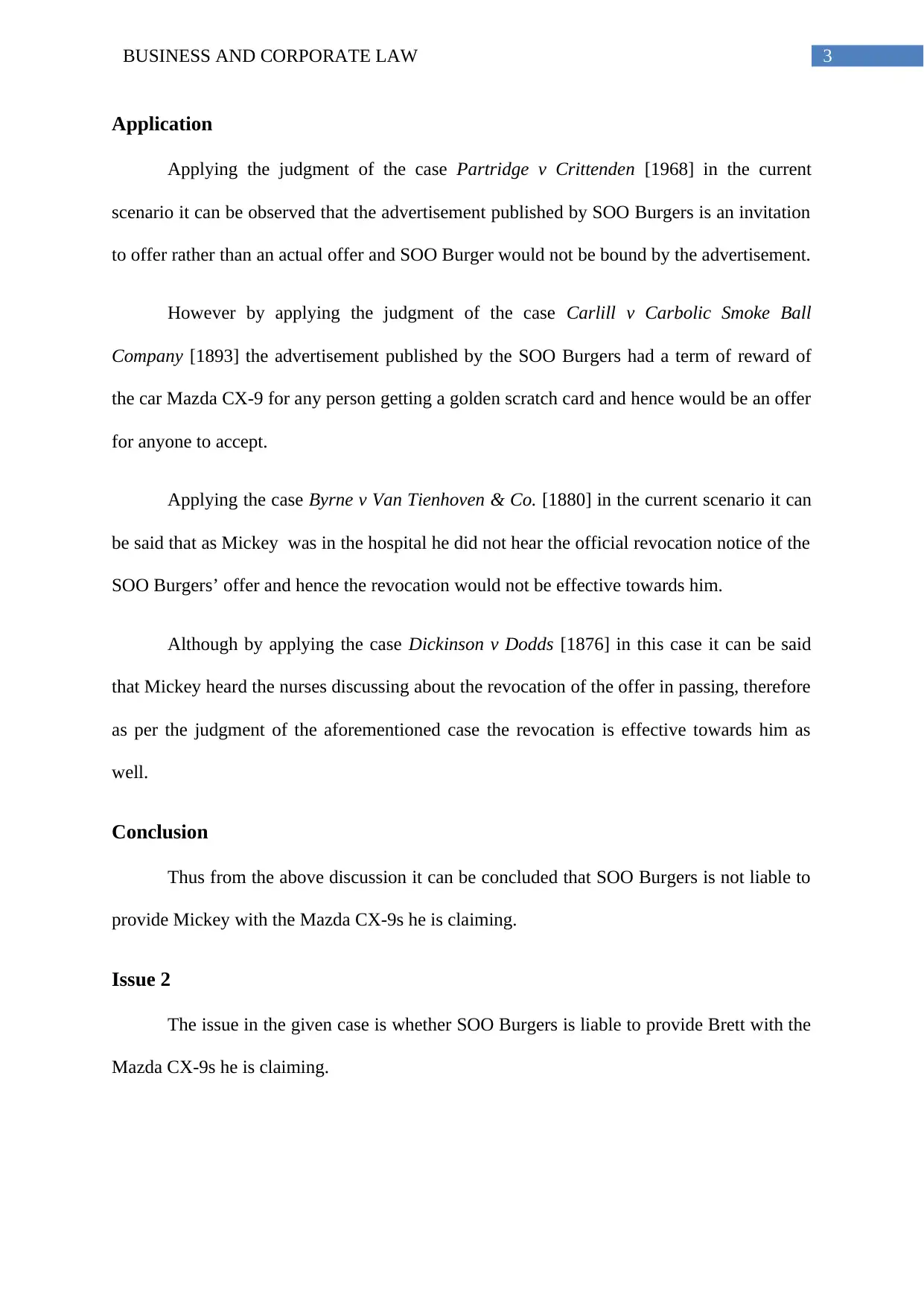
3BUSINESS AND CORPORATE LAW
Application
Applying the judgment of the case Partridge v Crittenden [1968] in the current
scenario it can be observed that the advertisement published by SOO Burgers is an invitation
to offer rather than an actual offer and SOO Burger would not be bound by the advertisement.
However by applying the judgment of the case Carlill v Carbolic Smoke Ball
Company [1893] the advertisement published by the SOO Burgers had a term of reward of
the car Mazda CX-9 for any person getting a golden scratch card and hence would be an offer
for anyone to accept.
Applying the case Byrne v Van Tienhoven & Co. [1880] in the current scenario it can
be said that as Mickey was in the hospital he did not hear the official revocation notice of the
SOO Burgers’ offer and hence the revocation would not be effective towards him.
Although by applying the case Dickinson v Dodds [1876] in this case it can be said
that Mickey heard the nurses discussing about the revocation of the offer in passing, therefore
as per the judgment of the aforementioned case the revocation is effective towards him as
well.
Conclusion
Thus from the above discussion it can be concluded that SOO Burgers is not liable to
provide Mickey with the Mazda CX-9s he is claiming.
Issue 2
The issue in the given case is whether SOO Burgers is liable to provide Brett with the
Mazda CX-9s he is claiming.
Application
Applying the judgment of the case Partridge v Crittenden [1968] in the current
scenario it can be observed that the advertisement published by SOO Burgers is an invitation
to offer rather than an actual offer and SOO Burger would not be bound by the advertisement.
However by applying the judgment of the case Carlill v Carbolic Smoke Ball
Company [1893] the advertisement published by the SOO Burgers had a term of reward of
the car Mazda CX-9 for any person getting a golden scratch card and hence would be an offer
for anyone to accept.
Applying the case Byrne v Van Tienhoven & Co. [1880] in the current scenario it can
be said that as Mickey was in the hospital he did not hear the official revocation notice of the
SOO Burgers’ offer and hence the revocation would not be effective towards him.
Although by applying the case Dickinson v Dodds [1876] in this case it can be said
that Mickey heard the nurses discussing about the revocation of the offer in passing, therefore
as per the judgment of the aforementioned case the revocation is effective towards him as
well.
Conclusion
Thus from the above discussion it can be concluded that SOO Burgers is not liable to
provide Mickey with the Mazda CX-9s he is claiming.
Issue 2
The issue in the given case is whether SOO Burgers is liable to provide Brett with the
Mazda CX-9s he is claiming.
Paraphrase This Document
Need a fresh take? Get an instant paraphrase of this document with our AI Paraphraser
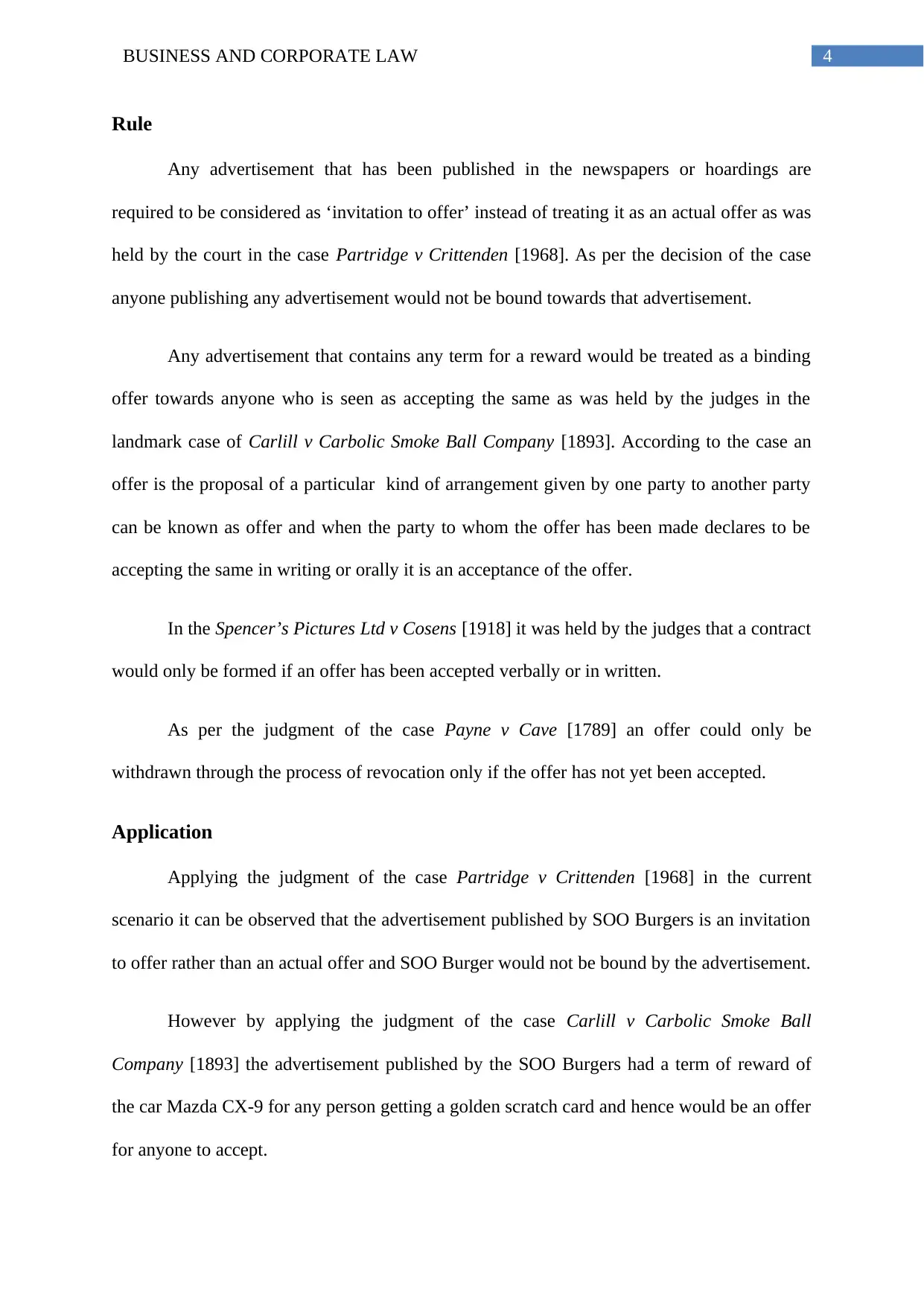
4BUSINESS AND CORPORATE LAW
Rule
Any advertisement that has been published in the newspapers or hoardings are
required to be considered as ‘invitation to offer’ instead of treating it as an actual offer as was
held by the court in the case Partridge v Crittenden [1968]. As per the decision of the case
anyone publishing any advertisement would not be bound towards that advertisement.
Any advertisement that contains any term for a reward would be treated as a binding
offer towards anyone who is seen as accepting the same as was held by the judges in the
landmark case of Carlill v Carbolic Smoke Ball Company [1893]. According to the case an
offer is the proposal of a particular kind of arrangement given by one party to another party
can be known as offer and when the party to whom the offer has been made declares to be
accepting the same in writing or orally it is an acceptance of the offer.
In the Spencer’s Pictures Ltd v Cosens [1918] it was held by the judges that a contract
would only be formed if an offer has been accepted verbally or in written.
As per the judgment of the case Payne v Cave [1789] an offer could only be
withdrawn through the process of revocation only if the offer has not yet been accepted.
Application
Applying the judgment of the case Partridge v Crittenden [1968] in the current
scenario it can be observed that the advertisement published by SOO Burgers is an invitation
to offer rather than an actual offer and SOO Burger would not be bound by the advertisement.
However by applying the judgment of the case Carlill v Carbolic Smoke Ball
Company [1893] the advertisement published by the SOO Burgers had a term of reward of
the car Mazda CX-9 for any person getting a golden scratch card and hence would be an offer
for anyone to accept.
Rule
Any advertisement that has been published in the newspapers or hoardings are
required to be considered as ‘invitation to offer’ instead of treating it as an actual offer as was
held by the court in the case Partridge v Crittenden [1968]. As per the decision of the case
anyone publishing any advertisement would not be bound towards that advertisement.
Any advertisement that contains any term for a reward would be treated as a binding
offer towards anyone who is seen as accepting the same as was held by the judges in the
landmark case of Carlill v Carbolic Smoke Ball Company [1893]. According to the case an
offer is the proposal of a particular kind of arrangement given by one party to another party
can be known as offer and when the party to whom the offer has been made declares to be
accepting the same in writing or orally it is an acceptance of the offer.
In the Spencer’s Pictures Ltd v Cosens [1918] it was held by the judges that a contract
would only be formed if an offer has been accepted verbally or in written.
As per the judgment of the case Payne v Cave [1789] an offer could only be
withdrawn through the process of revocation only if the offer has not yet been accepted.
Application
Applying the judgment of the case Partridge v Crittenden [1968] in the current
scenario it can be observed that the advertisement published by SOO Burgers is an invitation
to offer rather than an actual offer and SOO Burger would not be bound by the advertisement.
However by applying the judgment of the case Carlill v Carbolic Smoke Ball
Company [1893] the advertisement published by the SOO Burgers had a term of reward of
the car Mazda CX-9 for any person getting a golden scratch card and hence would be an offer
for anyone to accept.
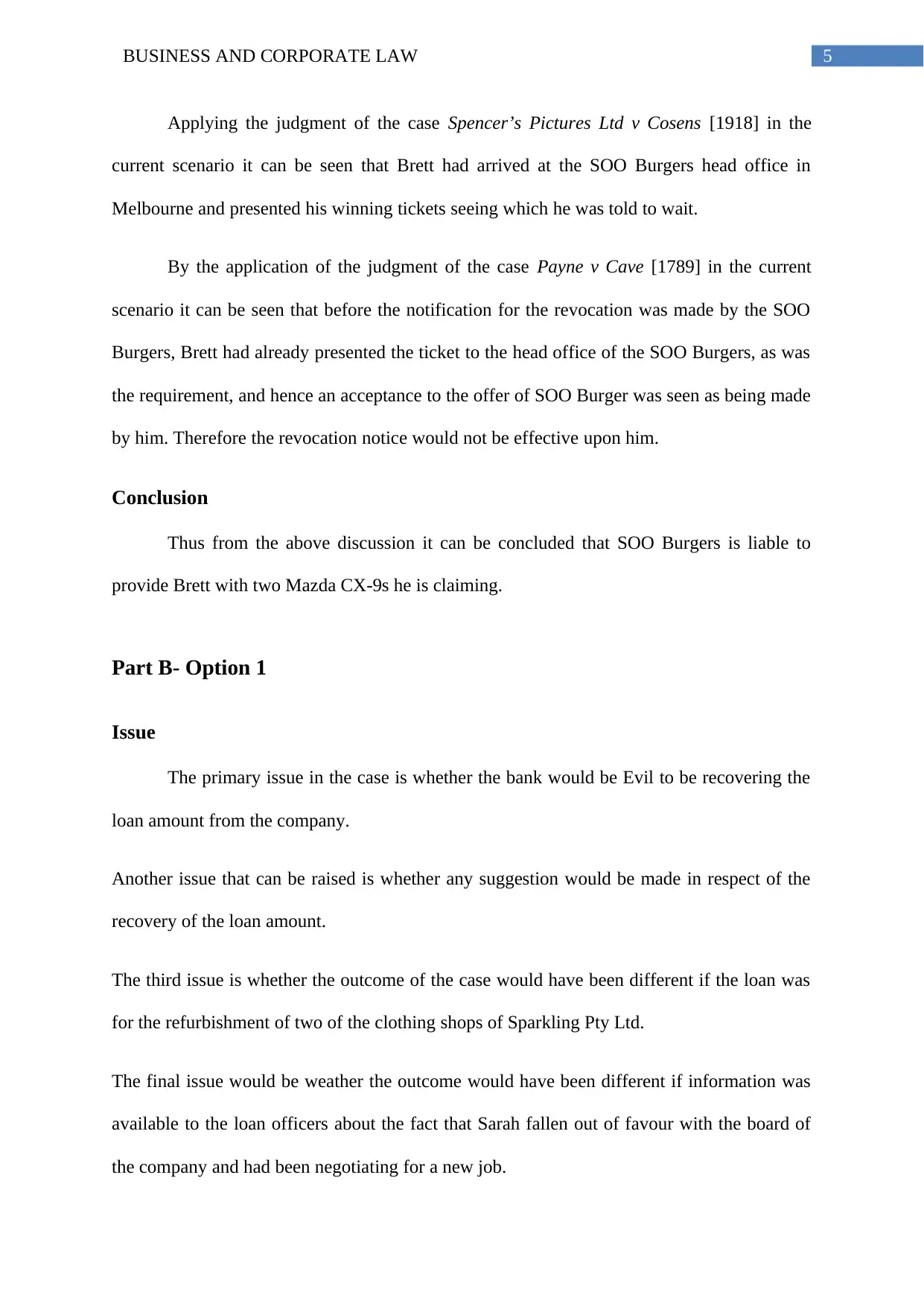
5BUSINESS AND CORPORATE LAW
Applying the judgment of the case Spencer’s Pictures Ltd v Cosens [1918] in the
current scenario it can be seen that Brett had arrived at the SOO Burgers head office in
Melbourne and presented his winning tickets seeing which he was told to wait.
By the application of the judgment of the case Payne v Cave [1789] in the current
scenario it can be seen that before the notification for the revocation was made by the SOO
Burgers, Brett had already presented the ticket to the head office of the SOO Burgers, as was
the requirement, and hence an acceptance to the offer of SOO Burger was seen as being made
by him. Therefore the revocation notice would not be effective upon him.
Conclusion
Thus from the above discussion it can be concluded that SOO Burgers is liable to
provide Brett with two Mazda CX-9s he is claiming.
Part B- Option 1
Issue
The primary issue in the case is whether the bank would be Evil to be recovering the
loan amount from the company.
Another issue that can be raised is whether any suggestion would be made in respect of the
recovery of the loan amount.
The third issue is whether the outcome of the case would have been different if the loan was
for the refurbishment of two of the clothing shops of Sparkling Pty Ltd.
The final issue would be weather the outcome would have been different if information was
available to the loan officers about the fact that Sarah fallen out of favour with the board of
the company and had been negotiating for a new job.
Applying the judgment of the case Spencer’s Pictures Ltd v Cosens [1918] in the
current scenario it can be seen that Brett had arrived at the SOO Burgers head office in
Melbourne and presented his winning tickets seeing which he was told to wait.
By the application of the judgment of the case Payne v Cave [1789] in the current
scenario it can be seen that before the notification for the revocation was made by the SOO
Burgers, Brett had already presented the ticket to the head office of the SOO Burgers, as was
the requirement, and hence an acceptance to the offer of SOO Burger was seen as being made
by him. Therefore the revocation notice would not be effective upon him.
Conclusion
Thus from the above discussion it can be concluded that SOO Burgers is liable to
provide Brett with two Mazda CX-9s he is claiming.
Part B- Option 1
Issue
The primary issue in the case is whether the bank would be Evil to be recovering the
loan amount from the company.
Another issue that can be raised is whether any suggestion would be made in respect of the
recovery of the loan amount.
The third issue is whether the outcome of the case would have been different if the loan was
for the refurbishment of two of the clothing shops of Sparkling Pty Ltd.
The final issue would be weather the outcome would have been different if information was
available to the loan officers about the fact that Sarah fallen out of favour with the board of
the company and had been negotiating for a new job.
⊘ This is a preview!⊘
Do you want full access?
Subscribe today to unlock all pages.

Trusted by 1+ million students worldwide
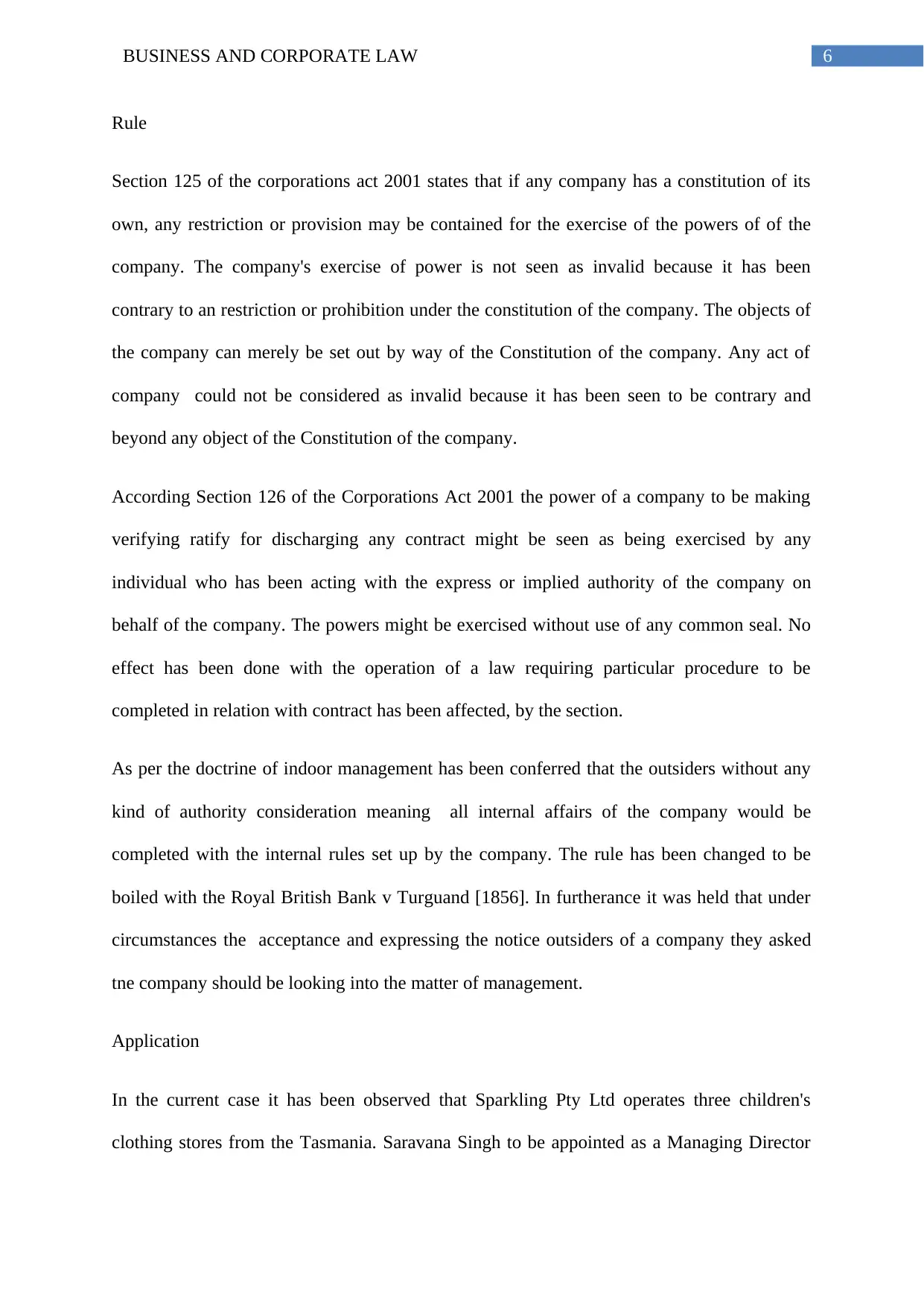
6BUSINESS AND CORPORATE LAW
Rule
Section 125 of the corporations act 2001 states that if any company has a constitution of its
own, any restriction or provision may be contained for the exercise of the powers of of the
company. The company's exercise of power is not seen as invalid because it has been
contrary to an restriction or prohibition under the constitution of the company. The objects of
the company can merely be set out by way of the Constitution of the company. Any act of
company could not be considered as invalid because it has been seen to be contrary and
beyond any object of the Constitution of the company.
According Section 126 of the Corporations Act 2001 the power of a company to be making
verifying ratify for discharging any contract might be seen as being exercised by any
individual who has been acting with the express or implied authority of the company on
behalf of the company. The powers might be exercised without use of any common seal. No
effect has been done with the operation of a law requiring particular procedure to be
completed in relation with contract has been affected, by the section.
As per the doctrine of indoor management has been conferred that the outsiders without any
kind of authority consideration meaning all internal affairs of the company would be
completed with the internal rules set up by the company. The rule has been changed to be
boiled with the Royal British Bank v Turguand [1856]. In furtherance it was held that under
circumstances the acceptance and expressing the notice outsiders of a company they asked
tne company should be looking into the matter of management.
Application
In the current case it has been observed that Sparkling Pty Ltd operates three children's
clothing stores from the Tasmania. Saravana Singh to be appointed as a Managing Director
Rule
Section 125 of the corporations act 2001 states that if any company has a constitution of its
own, any restriction or provision may be contained for the exercise of the powers of of the
company. The company's exercise of power is not seen as invalid because it has been
contrary to an restriction or prohibition under the constitution of the company. The objects of
the company can merely be set out by way of the Constitution of the company. Any act of
company could not be considered as invalid because it has been seen to be contrary and
beyond any object of the Constitution of the company.
According Section 126 of the Corporations Act 2001 the power of a company to be making
verifying ratify for discharging any contract might be seen as being exercised by any
individual who has been acting with the express or implied authority of the company on
behalf of the company. The powers might be exercised without use of any common seal. No
effect has been done with the operation of a law requiring particular procedure to be
completed in relation with contract has been affected, by the section.
As per the doctrine of indoor management has been conferred that the outsiders without any
kind of authority consideration meaning all internal affairs of the company would be
completed with the internal rules set up by the company. The rule has been changed to be
boiled with the Royal British Bank v Turguand [1856]. In furtherance it was held that under
circumstances the acceptance and expressing the notice outsiders of a company they asked
tne company should be looking into the matter of management.
Application
In the current case it has been observed that Sparkling Pty Ltd operates three children's
clothing stores from the Tasmania. Saravana Singh to be appointed as a Managing Director
Paraphrase This Document
Need a fresh take? Get an instant paraphrase of this document with our AI Paraphraser
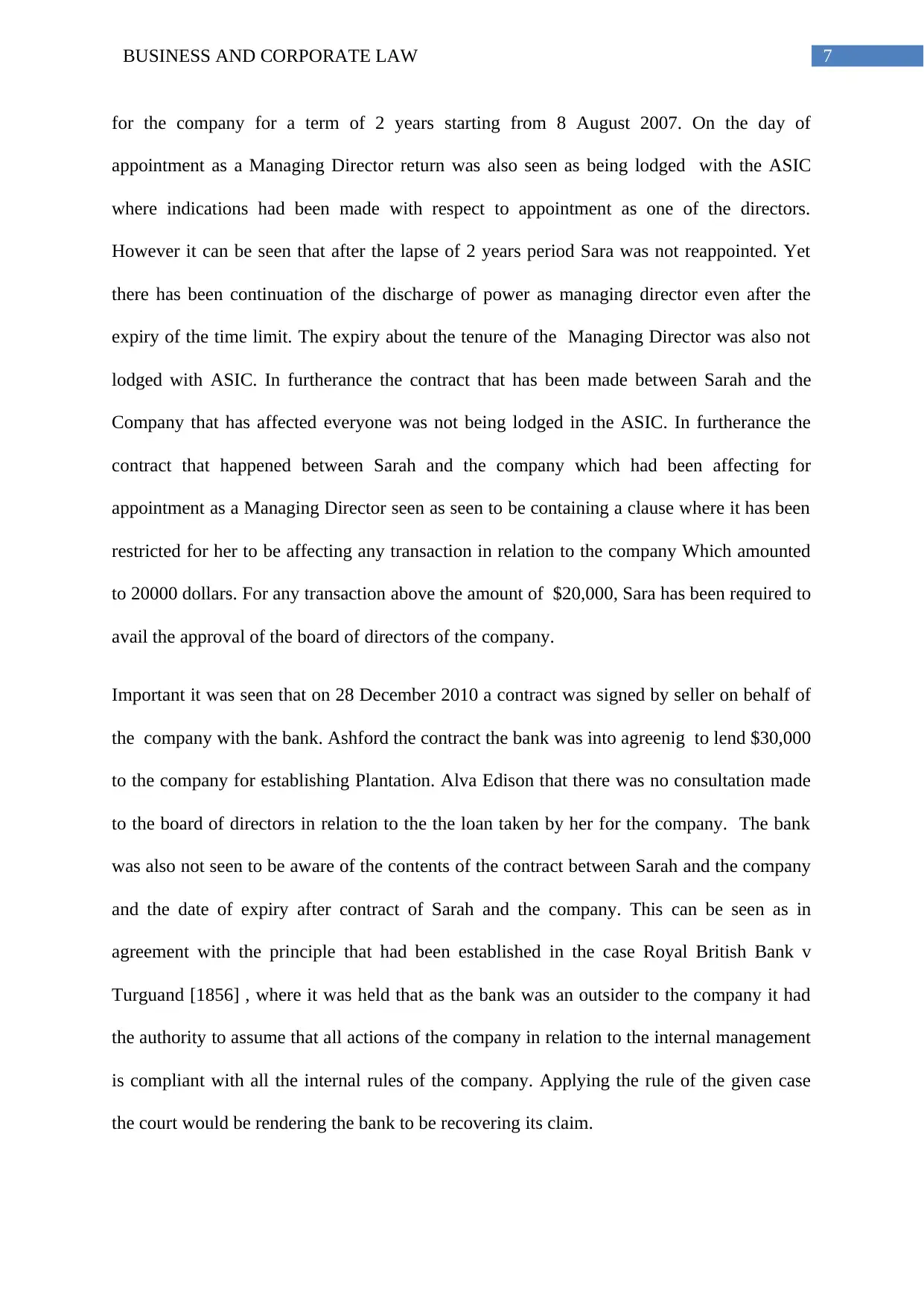
7BUSINESS AND CORPORATE LAW
for the company for a term of 2 years starting from 8 August 2007. On the day of
appointment as a Managing Director return was also seen as being lodged with the ASIC
where indications had been made with respect to appointment as one of the directors.
However it can be seen that after the lapse of 2 years period Sara was not reappointed. Yet
there has been continuation of the discharge of power as managing director even after the
expiry of the time limit. The expiry about the tenure of the Managing Director was also not
lodged with ASIC. In furtherance the contract that has been made between Sarah and the
Company that has affected everyone was not being lodged in the ASIC. In furtherance the
contract that happened between Sarah and the company which had been affecting for
appointment as a Managing Director seen as seen to be containing a clause where it has been
restricted for her to be affecting any transaction in relation to the company Which amounted
to 20000 dollars. For any transaction above the amount of $20,000, Sara has been required to
avail the approval of the board of directors of the company.
Important it was seen that on 28 December 2010 a contract was signed by seller on behalf of
the company with the bank. Ashford the contract the bank was into agreenig to lend $30,000
to the company for establishing Plantation. Alva Edison that there was no consultation made
to the board of directors in relation to the the loan taken by her for the company. The bank
was also not seen to be aware of the contents of the contract between Sarah and the company
and the date of expiry after contract of Sarah and the company. This can be seen as in
agreement with the principle that had been established in the case Royal British Bank v
Turguand [1856] , where it was held that as the bank was an outsider to the company it had
the authority to assume that all actions of the company in relation to the internal management
is compliant with all the internal rules of the company. Applying the rule of the given case
the court would be rendering the bank to be recovering its claim.
for the company for a term of 2 years starting from 8 August 2007. On the day of
appointment as a Managing Director return was also seen as being lodged with the ASIC
where indications had been made with respect to appointment as one of the directors.
However it can be seen that after the lapse of 2 years period Sara was not reappointed. Yet
there has been continuation of the discharge of power as managing director even after the
expiry of the time limit. The expiry about the tenure of the Managing Director was also not
lodged with ASIC. In furtherance the contract that has been made between Sarah and the
Company that has affected everyone was not being lodged in the ASIC. In furtherance the
contract that happened between Sarah and the company which had been affecting for
appointment as a Managing Director seen as seen to be containing a clause where it has been
restricted for her to be affecting any transaction in relation to the company Which amounted
to 20000 dollars. For any transaction above the amount of $20,000, Sara has been required to
avail the approval of the board of directors of the company.
Important it was seen that on 28 December 2010 a contract was signed by seller on behalf of
the company with the bank. Ashford the contract the bank was into agreenig to lend $30,000
to the company for establishing Plantation. Alva Edison that there was no consultation made
to the board of directors in relation to the the loan taken by her for the company. The bank
was also not seen to be aware of the contents of the contract between Sarah and the company
and the date of expiry after contract of Sarah and the company. This can be seen as in
agreement with the principle that had been established in the case Royal British Bank v
Turguand [1856] , where it was held that as the bank was an outsider to the company it had
the authority to assume that all actions of the company in relation to the internal management
is compliant with all the internal rules of the company. Applying the rule of the given case
the court would be rendering the bank to be recovering its claim.
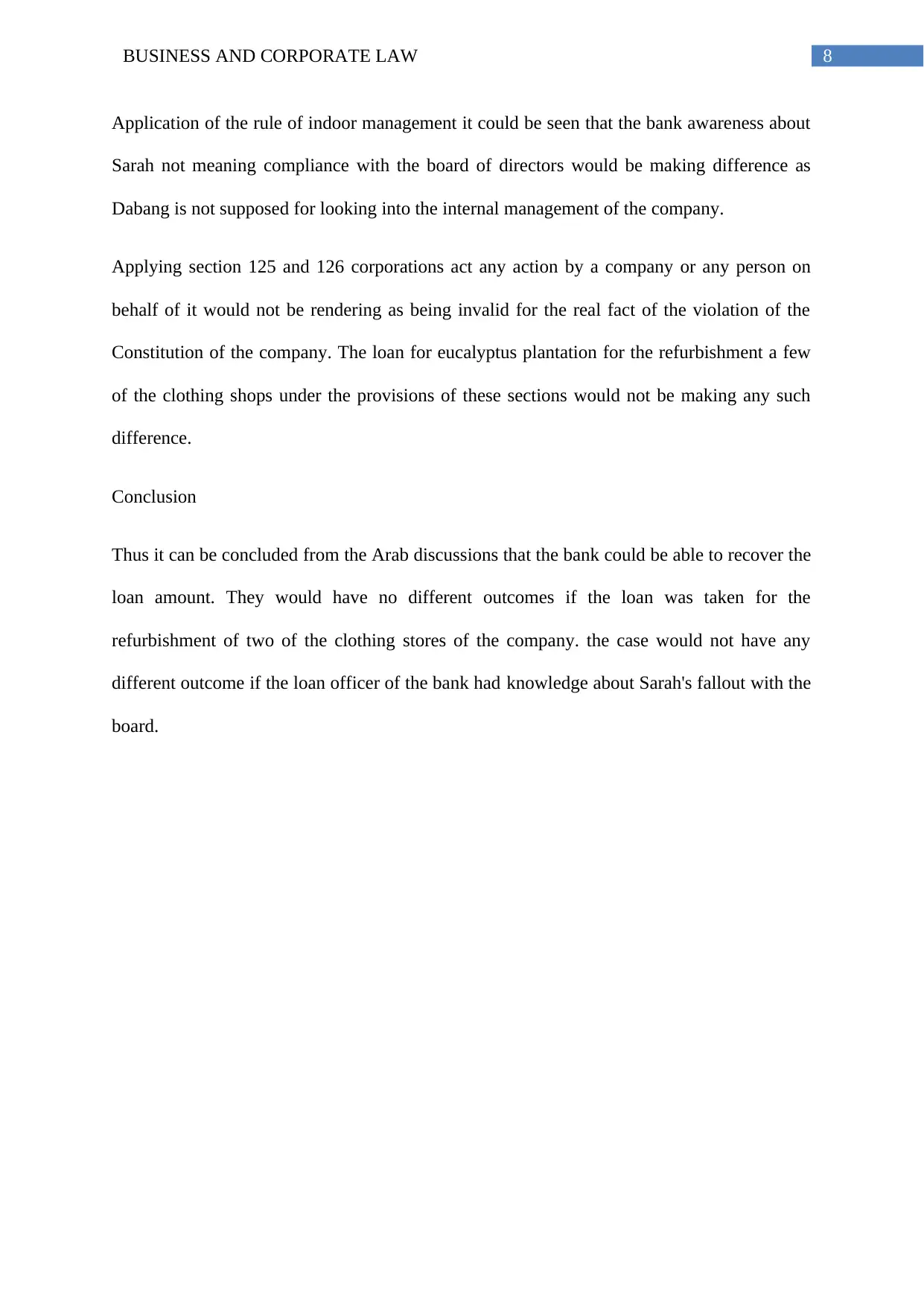
8BUSINESS AND CORPORATE LAW
Application of the rule of indoor management it could be seen that the bank awareness about
Sarah not meaning compliance with the board of directors would be making difference as
Dabang is not supposed for looking into the internal management of the company.
Applying section 125 and 126 corporations act any action by a company or any person on
behalf of it would not be rendering as being invalid for the real fact of the violation of the
Constitution of the company. The loan for eucalyptus plantation for the refurbishment a few
of the clothing shops under the provisions of these sections would not be making any such
difference.
Conclusion
Thus it can be concluded from the Arab discussions that the bank could be able to recover the
loan amount. They would have no different outcomes if the loan was taken for the
refurbishment of two of the clothing stores of the company. the case would not have any
different outcome if the loan officer of the bank had knowledge about Sarah's fallout with the
board.
Application of the rule of indoor management it could be seen that the bank awareness about
Sarah not meaning compliance with the board of directors would be making difference as
Dabang is not supposed for looking into the internal management of the company.
Applying section 125 and 126 corporations act any action by a company or any person on
behalf of it would not be rendering as being invalid for the real fact of the violation of the
Constitution of the company. The loan for eucalyptus plantation for the refurbishment a few
of the clothing shops under the provisions of these sections would not be making any such
difference.
Conclusion
Thus it can be concluded from the Arab discussions that the bank could be able to recover the
loan amount. They would have no different outcomes if the loan was taken for the
refurbishment of two of the clothing stores of the company. the case would not have any
different outcome if the loan officer of the bank had knowledge about Sarah's fallout with the
board.
⊘ This is a preview!⊘
Do you want full access?
Subscribe today to unlock all pages.

Trusted by 1+ million students worldwide
1 out of 9
Related Documents
Your All-in-One AI-Powered Toolkit for Academic Success.
+13062052269
info@desklib.com
Available 24*7 on WhatsApp / Email
![[object Object]](/_next/static/media/star-bottom.7253800d.svg)
Unlock your academic potential
Copyright © 2020–2026 A2Z Services. All Rights Reserved. Developed and managed by ZUCOL.





